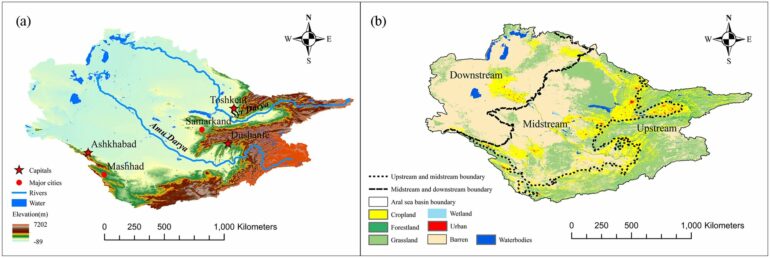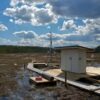The Aral Sea, located in Central Asia, has been shrinking in surface area due to climate change and human activities. This shrinkage has caused a regional ecological crisis, significantly affecting the key ecosystem services in the region.
In a study published in Scientific Reports, researchers, led by Prof. Yu Ruide from the Xinjiang Institute of Ecology and Geography of the Chinese Academy of Sciences, analyzed the spatiotemporal changes of four key ecosystem services in the Aral Sea basin, including water production, soil conservation, carbon storage, and habitat quality over two timeframes.
Researchers used the Future Land Use Simulation Model (FLUS) and Integrated Valuation of Ecosystem Services and Trade-offs (InVEST) models to simulate land use dynamics and ecosystem service provision in the Aral Sea basin under the Shared Socioeconomic Pathway-Representative Concentration Pathway (SSP-RCP) scenarios from Coupled Model Intercomparison Project Phase 6 (CMIP6).
From 1995 to 2020, they found that the major changes of land use in the Aral Sea basin are the reduction of water area (-49.59%) and the rapid expansion of urban areas (+504.65%). They also found a continuous decline in cropland, forestland, and grassland with ongoing expansion of bare land and urban areas over the same period, highlighting the escalating conflict between agricultural and urban growth.
In the projected future (2021–2100), researchers found a significant loss of ecosystem services across the Aral Sea basin under the SSP245 scenario, a notably agricultural degradation scenario. Future projections indicated that the relationship between habitat quality and soil conservation will be strengthened, while the relationship between habitat quality, water quantity, and soil conservation is expected to weaken.
“It’s worth noting that synergies and tradeoffs exist between different ecosystem service combinations, thus restoration plans for the Aral Sea region must be carefully designed,” said Prof. Yu Yang, corresponding author of this study.
This study helps to understand the dynamic changes of ecosystem services in the Aral Sea basin, and provides a reference for formulating land management plans that take into account ecosystem services.
More information:
Jing He et al, Spatiotemporal variations of ecosystem services in the Aral Sea basin under different CMIP6 projections, Scientific Reports (2024). DOI: 10.1038/s41598-024-62802-9
Provided by
Chinese Academy of Sciences
Citation:
Study reveals spatiotemporal changes of ecosystem services in the Aral Sea basin (2024, June 24)



